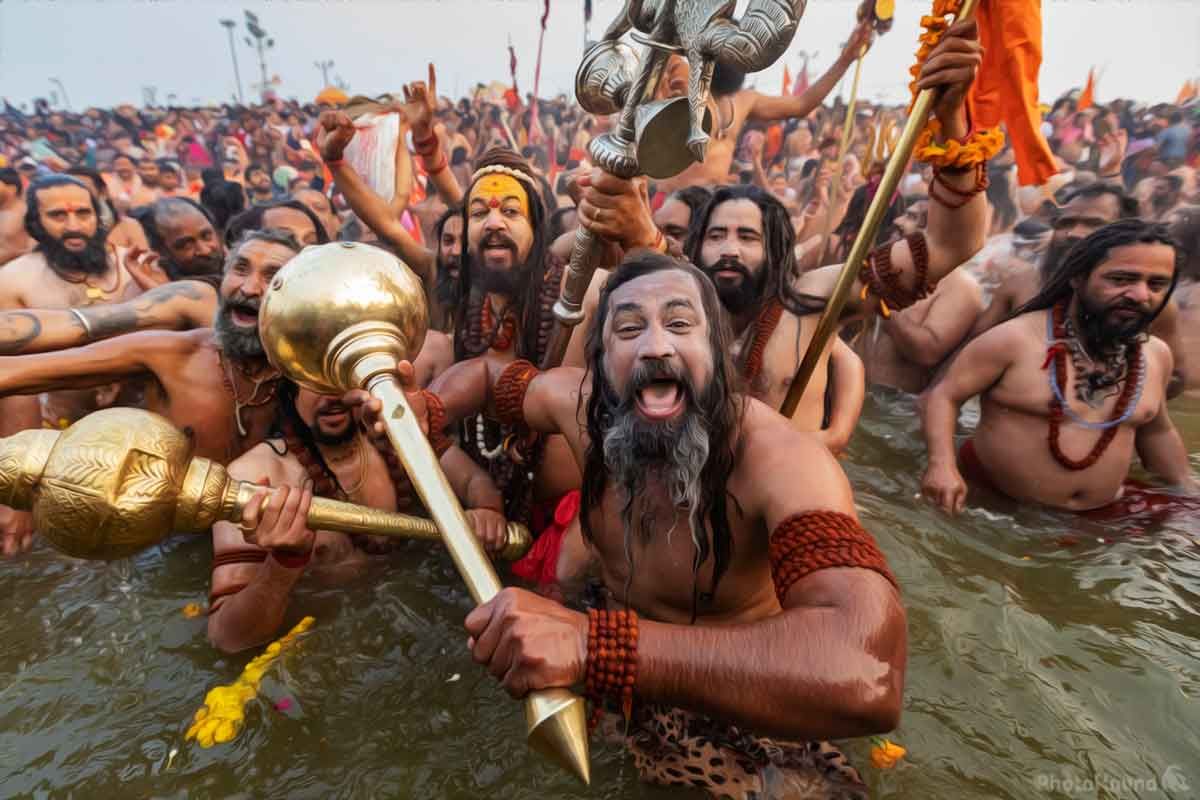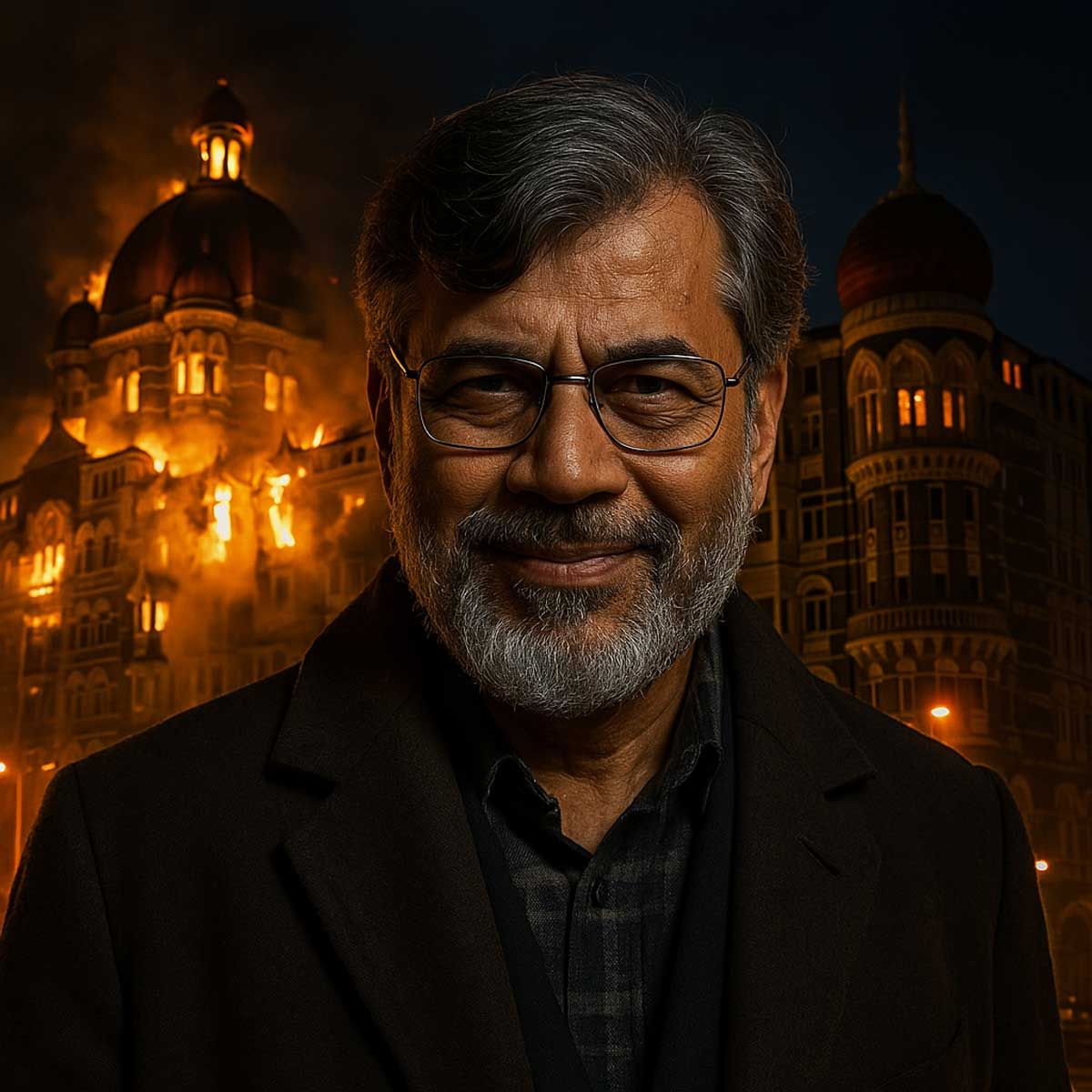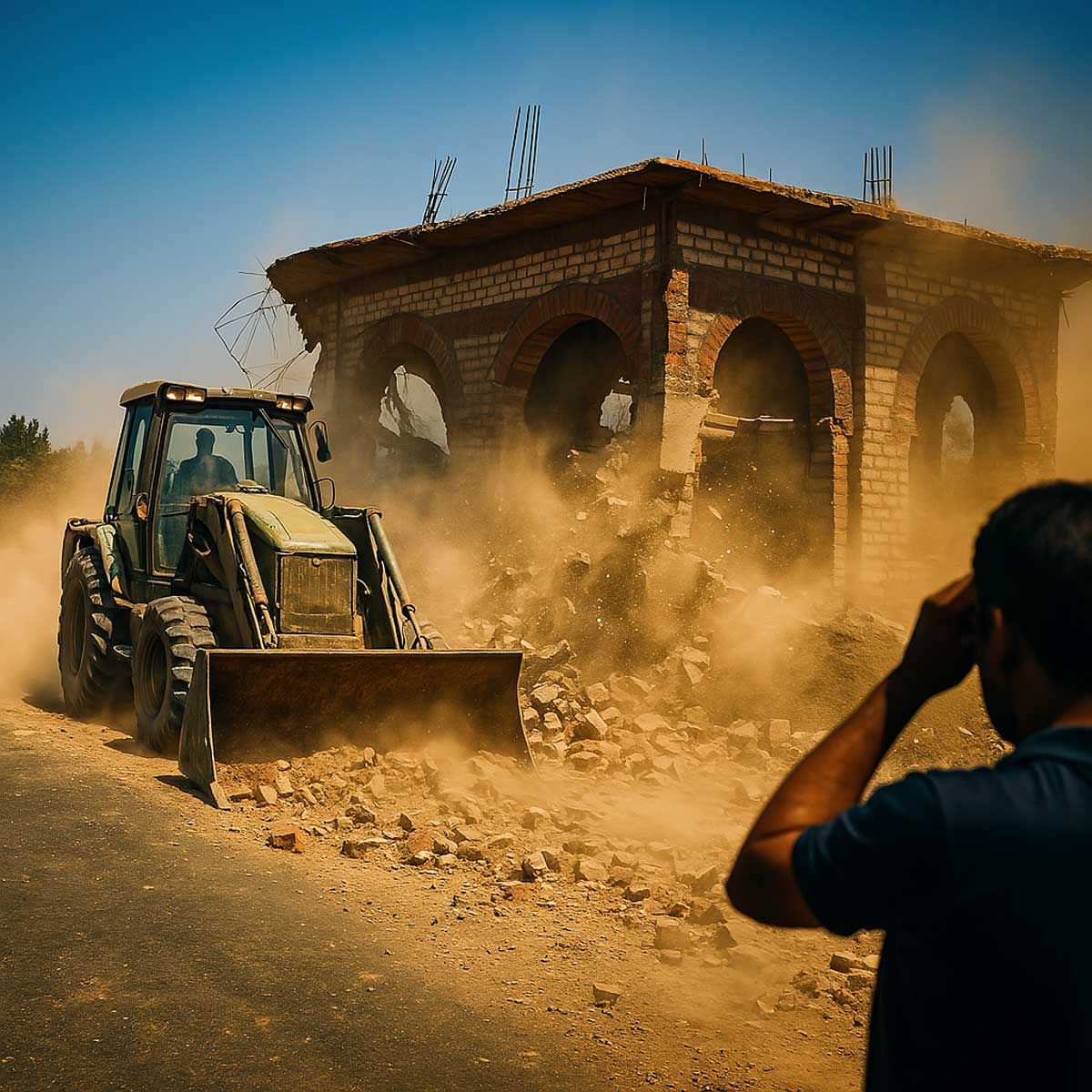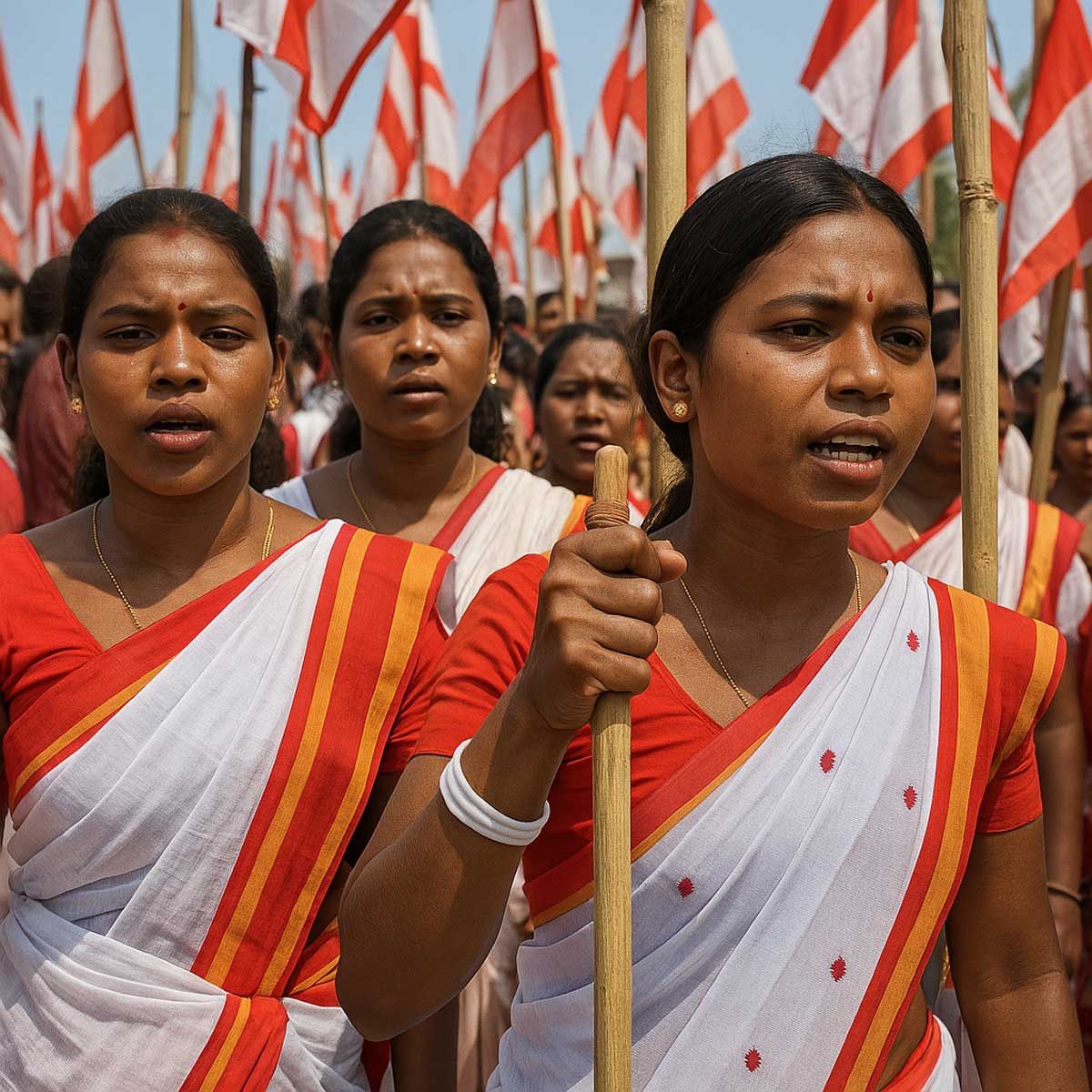More Coverage
Twitter Coverage
Satyaagrah
Written on
Satyaagrah
Written on
Satyaagrah
Written on
Satyaagrah
Written on
Satyaagrah
Written on
JOIN SATYAAGRAH SOCIAL MEDIA
Yogi Adityanath spearheads a transformative Kumbh Mela with AI-driven security, 700 electric buses, zero plastic, and a pledge to double Prayagraj's area, ensuring millions experience a safe, spiritual, and eco-friendly pilgrimage like never before

Uttar Pradesh Chief Minister Yogi Adityanath made it clear on Sunday that all necessary arrangements for the upcoming Mahakumbh Mela 2025 in Prayagraj are well underway, with a completion target set for December 15. The CM underscored that the government is committed to providing top-notch facilities to the millions of devotees expected to attend the festival. One of the main focuses of the preparations is to enhance safety measures, for which "AI tools are being implemented to ensure security," ensuring a secure environment for the pilgrims throughout the event.
|
Additionally, a strong push for "zero plastic usage" is part of the government's initiative to keep the Mahakumbh eco-friendly. With a focus on reducing the environmental impact, the administration is taking significant steps to minimize waste and prevent any plastic from being used, further aligning with their commitment to sustainability. Another key feature of the preparations includes doubling the size of the Kumbh area to accommodate the expected influx of visitors.
As part of the logistical planning, CM Yogi emphasized that no devotee will need to walk more than 1 kilometer during the festival days, with the exception of the 6 peak days. These peak days include important Hindu festivals such as Makar Sankranti, Mouni Amawasya, Mahashivratri, Posh Purnima, and Maghi Purnima. The plan is designed to ensure that devotees can move comfortably and with ease, avoiding long walks wherever possible.
To further assist in this effort, the government has arranged for more than 700 shuttle electric buses to facilitate the transport of devotees across the vast area. This measure will significantly improve accessibility and mobility for pilgrims, allowing them to focus on their spiritual journey without worrying about transportation challenges.
"We have set a deadline of December 15 to finish all the preparations. We are going to provide all the facilities here. The Kumbh will expand in double area as compared to the Prayagraj Kumbh 2013." These were the words of Uttar Pradesh Chief Minister Yogi Adityanath as he discussed the extensive arrangements for the Mahakumbh 2025 in Prayagraj. The preparations are in full swing, with a clear deadline to ensure all necessary facilities are ready for the millions of devotees expected to attend. The Mahakumbh is set to occupy twice the area compared to the Kumbh held in 2013, underscoring the magnitude of this upcoming event.
|
The Chief Minister emphasized the efforts to ensure convenience for the devotees. "Except for all 6 peak days between January 13 to February 26 (Makar Sankranti, Mouni Amawasya, Mahashivratri, Posh Purnima, Maghi Purnima), we will try that no devotee would walk more than one kilometre on all days to take a holy bath." Special care is being taken to reduce the walking distance for pilgrims, ensuring that, apart from these six peak days, devotees can reach the holy river with ease.
To support this, "more than 700 shuttle electric buses will be present at the spot to provide services to the devotees," CM Yogi stated. These buses will ensure that devotees are transported efficiently, minimizing long walks and helping maintain smooth mobility throughout the festival grounds.
Addressing the critical issue of cleanliness, Yogi Adityanath confirmed that "no solid or liquid wastes" will be allowed to flow into the Ganga or Yamuna rivers during the Mahakumbh. "The sewage will either be discharged or diverted only after the treatment," he added.
The Chief Minister also stressed that safety is a top priority, stating, "We are using the Artificial Intelligence tool for safety measures." The use of AI technology is expected to enhance security throughout the event, ensuring that the large crowds can participate in the festival without concerns for their safety.
Yogi Adityanath further recalled the success of the 2019 Kumbh, affirming that this year’s Mahakumbh will aim to surpass the previous one. "The Kumbh of Prayagraj 2019 had set a standard. We will be successful in establishing a grand and divine Kumbh as a clean, safe, and well-organized Kumbh at an even better level," he confidently declared, indicating that the state is prepared to deliver an even more exceptional event this time around.
Finally, CM Yogi acknowledged the importance of collaboration in ensuring the success of the Mahakumbh, stating, "You had a big role in the success of Kumbh in 2019. This time again, with your positive role, you all will have a positive contribution in taking Prayagraj and this grand event to the global stage." His words reflect the government’s confidence in working collectively to make Mahakumbh 2025 a globally recognized and well-organized event.
|
"Preparations for Mahakumbh 2025 are going on at a war footing and there are no obstacles in the preparations," he said. The state is also working closely with central government departments to ensure the preparations are completed in time, reflecting the level of commitment from both state and national levels to ensure a successful Mahakumbh in 2025.
"After our meeting with 13 Akharas, Acharyabada and Tirthpurohits for Prayagraj Mahakumbh 2025 concluded, we did a detailed review of how the work for Mahakumbh is progressing by various departments of the central and state government." Uttar Pradesh Chief Minister Yogi Adityanath shared these details after the meeting to emphasize the coordination between religious leaders and the government to ensure that preparations for Mahakumbh 2025 are on track.
"2019 Kumbh Mela was an example that a Kumbh can be safe as well as organised. The team of Uttar Pradesh has experience…" This remark highlighted the state’s confidence in managing such large-scale events, built on the successful execution of the 2019 Kumbh Mela. Yogi Adityanath further mentioned the significant investments being made to improve Prayagraj. "Till now under projects worth Rs 5600 crores, we have to make Prayagraj a beautiful place."
Speaking about the speed of preparations, he said, "Preparations for Mahakumbh 2025 are going on at a war footing." Reflecting on the scale of the previous event, CM Yogi reminded everyone that "about 24 crore people took a holy bath in Sangam," making the 2019 Kumbh a globally recognized event. He also mentioned, "Several political leaders from the world also came to Prayagaj to witness the grand Kumbh mela."
The Chief Minister assured that preparations are moving forward smoothly. "The Uttar Pradesh government along with several central governments including NHAI, AAI, etc, is preparing for the same. There is no obstacle in the preparation of Mahakumbh." This collaboration with various government bodies is a key part of the preparations.
Earlier in the day, CM Yogi Adityanath unveiled the logo of Maha Kumbh-2025 in Prayagraj. During his visit, he reviewed the preparations, met with saints, and performed puja.
The Maha Kumbh Mela is set to take place from January 14 to February 26, 2025, with tight security measures in place. The main bathing festival, or "Shahi Snan" (royal baths), will be held on January 14 (Makar Sankranti), January 29 (Mauni Amavasya), and February 3 (Basant Panchami). Additionally, the UP government has announced subsidies to help transform dhabas, restaurants, and hotels along major routes to provide better facilities to tourists and devotees attending the festival.
|
Mahakumbh
Kumbh Mela, or Kumbha Mela, is a grand congregation of pilgrims gathering to take a ritual bath in sacred rivers, symbolizing purification from sins. The festival rotates between four sacred locations: Allahabad (now Prayagraj), Haridwar, Ujjain, and Nashik. The event is the largest peaceful assembly in the world, celebrated every 12 years. The Shahi Snan, or royal bath, is the main ritual, where saints lead the ceremonial dip. A Maha Kumbh, held every 144 years, further magnifies the significance of this spiritual gathering.
The festival transcends religious and social boundaries, as people from every walk of life, irrespective of religion or caste, come together, making it a symbol of unity. The Kumbh Mela offers a unique blend of languages, traditions, and cultures, where different foods, clothing styles, and ways of life come into view. Despite no formal invitation, millions of people make their way to participate, underscoring its spiritual and cultural importance.
The word "Kumbh" comes from Sanskrit, meaning pitcher, also known as Kalasha. It’s associated with the zodiac sign Aquarius and carries deep spiritual symbolism. Kumbh also represents the human body, with the sun, earth, sea, and the Hindu god Vishnu being its synonyms. The festival symbolizes a confluence of cultures and is a representation of spiritual awakening.
|
To truly grasp the significance of Kumbh Mela, one must understand the sacredness of the Ganga (Ganges) River. Devotees believe that a dip in the Ganga cleanses one of past sins and brings them closer to moksha, or liberation from the cycle of life and death. However, simply bathing isn’t enough—living a pure life thereafter is key to maintaining spiritual benefits. The festival draws people who are willing to endure discomfort, like sleeping in open spaces and traveling long distances, just to bathe in the holy rivers and seek blessings from saints.
The Kumbh Mela is a congregation not only of pilgrims but also of holy ascetics, sadhus, sadhvis, and religious followers who have renounced worldly pleasures. These holy men and women, many from the 13 Akharas, begin the sacred dip during the Shahi Snan, marking the commencement of the festival. The presence of women ascetics, or sadhvis, is equally important, showcasing the inclusivity of the festival.
In addition to religious participation, many organizations, including temple trusts and NGOs, contribute to making Kumbh Mela a success. Groups like the Trimbakeshwar Temple Trust and civil societies like the Ganga Sabha assist with planning and logistics, working alongside the state and city governments. Their joint efforts ensure that the festival is peaceful and well-organized for the millions of attendees.
|
The devout firmly believe that by bathing in the sacred river Ganga during Kumbh Mela, one is freed from their past sins, or karma, and becomes eligible for liberation from the cycle of birth and death. However, a pure lifestyle must follow this ritual, as the lack of it leads to further karmic burdens.
Pilgrims come from all walks of life, enduring long journeys and physical discomforts like sleeping outdoors in cold weather, all for the chance to bathe in the holy river and meet revered saints. The Kumbh Mela is primarily a congregation of kalpavasis, sadhus, visitors, and spiritual aspirants, predominantly Hindus. The traditional bearers of this religious event are the holy men, ascetics, saints, sadhus, sadhvis, and sants who have renounced worldly life to pursue religious devotion.
These ascetics are often affiliated with religious organizations, Ashrams, and Akhadas, or they live independently, relying on alms for sustenance. There are 13 Akhadas in India, each with its own President or Mahant. The President of each Akhada is the first to take the sacred dip in the river, officially marking the beginning of the Kumbh Mela proceedings.
While male ascetics are traditionally more prominent, women ascetics, or sadhvis, also participate in large numbers, demonstrating equal enthusiasm and devotion at the Kumbh Mela. The event is further supported by several Temple Trust organizations such as the Trimbakeshwar Temple Trust of Nashik and other organizations like the Ganga Sabha of Haridwar. Civil societies and Non-Governmental Organizations (NGOs), including the Godavari Gatarikaran Virodhi Manch of Nashik, play a vital role in facilitating the festival and ensuring its success.
Alongside the spiritual significance, the Kumbh Mela involves massive organizational efforts. The respective state and city governments play an integral role, ensuring that millions of attendees, including devotees and visitors, are well-accommodated. The participation of government and administrative bodies is essential to the smooth operation and success of this grand spiritual event, making the Kumbh Mela a remarkable and awe-inspiring experience for all involved.
 Support Us
Support Us
Satyagraha was born from the heart of our land, with an undying aim to unveil the true essence of Bharat. It seeks to illuminate the hidden tales of our valiant freedom fighters and the rich chronicles that haven't yet sung their complete melody in the mainstream.
While platforms like NDTV and 'The Wire' effortlessly garner funds under the banner of safeguarding democracy, we at Satyagraha walk a different path. Our strength and resonance come from you. In this journey to weave a stronger Bharat, every little contribution amplifies our voice. Let's come together, contribute as you can, and champion the true spirit of our nation.
 |  |  |
| ICICI Bank of Satyaagrah | Razorpay Bank of Satyaagrah | PayPal Bank of Satyaagrah - For International Payments |
If all above doesn't work, then try the LINK below:
Please share the article on other platforms
DISCLAIMER: The author is solely responsible for the views expressed in this article. The author carries the responsibility for citing and/or licensing of images utilized within the text. The website also frequently uses non-commercial images for representational purposes only in line with the article. We are not responsible for the authenticity of such images. If some images have a copyright issue, we request the person/entity to contact us at satyaagrahindia@gmail.com and we will take the necessary actions to resolve the issue.
Related Articles
- BJP’s aim to restore the Sanatan faith, glorious history and pride of India: ‘How can Mathura-Vrindavan be left behind,’ says Yogi Adityanath ahead of visiting Krishna Janmabhoomi
- "Identify anti-CAA and NRC rioters, members of the PFI": Instructions to all district police chiefs, Uttar Pradesh govt increases security around mosques to prevent violence after Friday prayers, to use drones, conduct flag march and drills
- "Breaking free, forging forward": Revolutionizing UP's bureaucracy, Yogi Adityanath govt decides in favour of removing mandatory Urdu tests for sub-registrar jobs, to replace Persian & Urdu with Hindi in registry documents for simplicity and accessibility
- Taking a swift U-turn Priyanka Gandhi Vadra said that her declaration as a Congress’ CM candidate for UP was a “statement made in irritation" because the media were asking the same question again and again
- "Every problem has a gift for you in its hands": Prayagraj | Uttar Pradesh Chief Minister Yogi Adityanath will hand over keys to beneficiaries of flats in PM urban housing scheme developed on land confiscated from slain mafia-turned-politician Atiq Ahmad
- 'Any direction issued by CM Yogi is a ‘sant vachan’ and we are bound to follow his directions': Shri Krishna Janmabhoomi Trust in Mathura stops using loudspeakers following Yogi Adityanath’s guidelines
- Vidya Kumbh in Mahakumbh 2025, led by CM Yogi Adityanath empowers children of 15,000 sanitation workers with 5 free smart schools, offering uniforms, books, meals, and certificates to ensure education and upliftment for marginalized families
- In a swift action Uttar Pradesh Police removed over 11,000 loudspeakers from religious places, volume of 35,000 loudspeakers reduced to the permissible levels: Both Hindu and Muslim Religious leaders agreed
- UP CM Yogi Adityanath directs that there will be no Namaz on the streets in Uttar Pradesh, says, "Removal of thousands of mics and loudspeakers from religious places brought great relief to people in the state"
- Savitri Devi broke into tears when Yogi Adityanath decided to leave for Gorakhpur to take vow of sainthood, and today her eyes contain the same tears brimming with pride Yogi has emerged as a Chief Minister of Uttar Pradesh
- Gone are the days when electricity connections and uninterrupted supplies were alien things in Uttar Pradesh: State’s electrification proves that it takes a Yogi to light up a state left in darkness by the SP-BSP regime
- All Karachi based Dawat-e-Islami schools in Pilbhit shut down by UP Govt after linkage found with murder of Hindu tailor Kanhaiya Lal from Udaipur, organization was collecting funds using donation boxes for terror funding from places all over the city
- "Collective responsibility to maintain the law and order. Think about the future. Don’t spoil your own future by your own deeds": Mosques and Muslim leaders appeal the Muslim community to not indulge in violence after Friday prayers
- Demolition drive against infamous gangster Mohammad Asif alias Pappu Smart carried by Yogi Govt, razed all his illegal properties to the ground: several cases including murder, loot, and extortion were registered against him
- During the Durga Visarjan in Bahraich, UP, Muslims objected to DJ music, leading to stone-pelting from their side, Ramgopal Mishra, recently married, was shot 24 times; eyewitnesses allege attackers used the police lathi-charge to kill him, blaming police




























